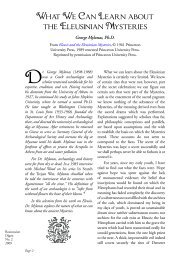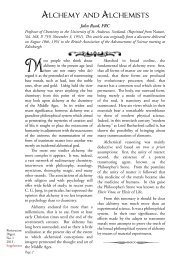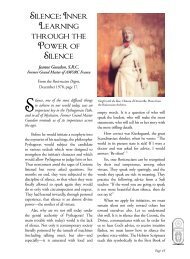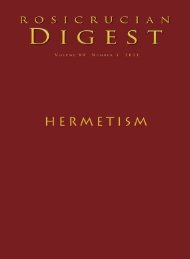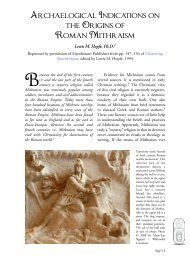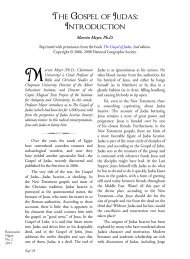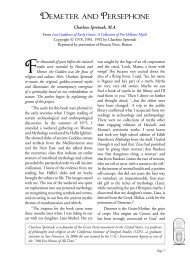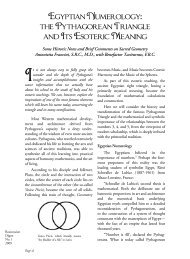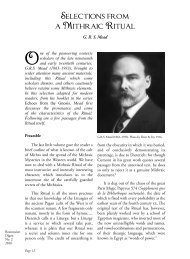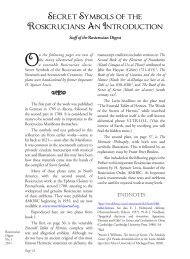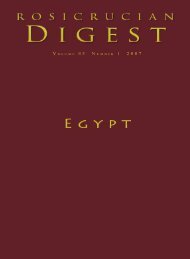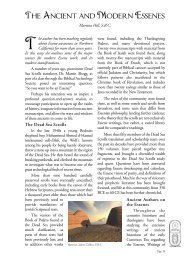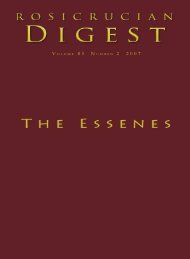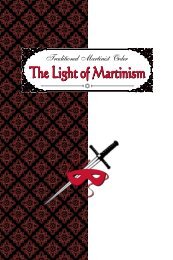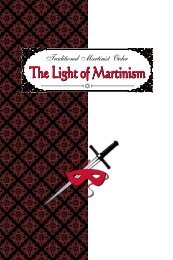The Grand Temple - Rosicrucian Order, AMORC
The Grand Temple - Rosicrucian Order, AMORC
The Grand Temple - Rosicrucian Order, AMORC
You also want an ePaper? Increase the reach of your titles
YUMPU automatically turns print PDFs into web optimized ePapers that Google loves.
Russian branch of the <strong>The</strong>osophical Society, probably before<br />
World War I. Furthermore, Helena had translated the Secret<br />
Doctrine into Russian. Around 1920, the Roerichs created the first<br />
study groups of Agni Yoga, a “movement for a living ethic which<br />
includes and synthesizes the philosophies and religious teachings of all<br />
periods,” and which advocated a yoga of action rather than asceticism.<br />
However, even though Nicholas Roerich was a member of various<br />
organizations, he was an independent spirit. He published his<br />
conception of the way towards illumination in the four cycles of his<br />
poems written between 1916 and 1921 under the title of Pismena.<br />
Russian edition: Pismena: Stikhi (Moscow: Sovremennik, 1974).<br />
English edition of Roerich’s poetry: Flame in Chalice. Translated by<br />
Mary Siegrist (New York: Roerich Museum Press, 1930).<br />
22 See Bulletin des Polaires, No. 1, May 9, 1930, p. 3. Considerable<br />
information regarding this movement is also found in Pierre Geyraud,<br />
Les Sociétés secrètes de Paris (Paris: Émile-Paul frères 1938) pp. 56-66.<br />
23 It involves a divinatory practice based on mathematics, whose<br />
process was described by Zam Bhotiva in Asia Mysteriosa, l’oracle<br />
de la Force astrale comme moyen de communication avec les “Petites<br />
Lumières d’Orient” (Paris: Dorbon-Aîné, 1929). For a time René<br />
Guénon was enthusiastic about this oracle. He then distanced<br />
himself from the Polaires, judging the messages transmitted by the<br />
initiates of the Himalayas to be insignificant and pitiful (see his<br />
critique in Le Voile d’Isis, February 1931).<br />
24 In this instance we will use the most common name of this<br />
group. At its creation Émile Dantinne gave it the name of the<br />
Ordre d’Hermès Trismégiste, from which Jean Mallinger created<br />
the <strong>Order</strong> of Hermès Tétramégiste, also called the Ordre<br />
hermétiste tétramégiste et mystique, or Ordre pythagoricien.<br />
25 Not all of them were members at the same time; thus, we have<br />
given them all together so as not to complicate matters.<br />
26 “Qu’est-ce que la FUDOSI?” Rose-Croix, No. 128, hiver 1983,<br />
p. 4. (French <strong>Grand</strong> Lodge of <strong>AMORC</strong>)<br />
27 Lucien Sabah, Une Police politique de Vichy: le service des sociétés<br />
secretes (Paris: Klincksieck, 1996) pp. 456-458. <strong>The</strong>se documents<br />
enlighten in a fresh way the proceedings started against Émile<br />
Dantinne at the Liberation.<br />
28 Mansions of the Soul (San Jose: <strong>Grand</strong> Lodge of the English<br />
Language Jurisdiction of <strong>AMORC</strong>, 1986) paperbound<br />
edition, p. 134.<br />
29 Extract from “<strong>The</strong> Colored Race,” <strong>Rosicrucian</strong> Forum, October<br />
1932, p. 61. In the same magazine are some articles that<br />
H. Spencer Lewis wrote regarding this subject: “About My<br />
Jewish Attitude,” February 1938, pp. 118-119; “<strong>The</strong> Karma of<br />
the Jews,” April 1938, pp. 141-142; and “<strong>The</strong> Aryan Supremacy,”<br />
August 1939, pp. 24-25.<br />
30 <strong>The</strong> latter had already profited from Hans Grüter’s feebleness,<br />
who became nearly blind after an illness, by having him sign in<br />
July 1950 an insidious document regarding H. Spencer Lewis.<br />
31 Among them, let us cite the case of Reuben Swinburne<br />
Clymer (1878-1966), who spent much of his lifetime in<br />
criticizing or imitating <strong>AMORC</strong>. He invented a counterfeit of<br />
FUDOSI, the FUDOSFI, about which certain occultists, such<br />
as Constant Chevillon, appeared complacent. He was the<br />
author of numerous works concerning <strong>Rosicrucian</strong>ism, where<br />
he gave proof of a frenzied imagination. He claimed to be the<br />
successor of the very controversial Pascal Beverly Randolph<br />
(concerning this matter, see the book by John Patrick Deveney,<br />
Pascal Beverly Randolph A Nineteenth Century Black American<br />
Spiritiualist <strong>Rosicrucian</strong> and Sex Magician (New York: State<br />
University of New York Press, 1997) pp. 140-143. According<br />
to the American Medical Association Journal (Vol. 81, No. 24,<br />
December 15, 1923), he directed in 1904 the International<br />
Academy of Natural and Sacred Sciences, which sold medical<br />
courses by mail and marketed various “youth elixirs,” “waters<br />
of life,” and “bioplasma.” Many times he was accused of fraud<br />
with the Philosophers of the Living Fire, who engaged in<br />
selling medical diplomas. Clymer himself bought a medical<br />
title from the Independent Medical College of Chicago, a<br />
veritable “diploma mill.”<br />
32 Shortly after the death of Ralph Maxwell Lewis, the Rose-Croix<br />
published a special issue containing many articles about the life<br />
and achievements of this exceptional man (No. 145, Spring<br />
1988). English edition: <strong>Rosicrucian</strong> Digest, Vol. 65 (1987),<br />
Memorial Issue.<br />
<strong>Rosicrucian</strong> Digest Submissions<br />
<strong>Rosicrucian</strong> Digest invites submissions of original historical studies, reflective essays, book reviews, poetry, original<br />
translations of public domain materials, and other offerings relevant to the subject matter of our thematic issues.<br />
Material submission deadlines for our 2006 issues are as follows: Atlantis (materials due September 15).<br />
Guidelines:<br />
Materials should be written in English. Articles and essays should have approximately 1000 - 2000 words;<br />
however, shorter and longer papers may also be considered. Shorter works (book reviews, poetry, etc.) need not<br />
observe the word count guidelines.<br />
Articles and essays should begin with a brief introduction.<br />
All language should be inclusive gender-neutral. Use active voice and positive language whenever possible and avoid<br />
<strong>Rosicrucian</strong> jargon or technical terms – <strong>Rosicrucian</strong> Digest is a public magazine.<br />
Do not copy or cite material directly from the <strong>Rosicrucian</strong> Monographs.<br />
If the submission includes illustrations with permission for reproduction, or in the public domain, please include<br />
these in the article, with clear and explanatory captions.<br />
If the article or essay has references, please format them as bibliographic style endnotes, and a bibliography may also<br />
be included if appropriate to the submission. Please use the Chicago Manual of Style (Turabian) for references.<br />
To submit your paper, please e-mail it as a MS Word or RTF file to editorinchief@rosicrucian.org.<br />
*Submission to <strong>Rosicrucian</strong> Digest implies that the article or other contribution has not been published elsewhere, submitted to another<br />
publication, and will not be submitted to another publication during the time it is under consideration by <strong>Rosicrucian</strong> Digest. Materials<br />
submitted will not be returned and articles may be reprinted in other jurisdictions.



